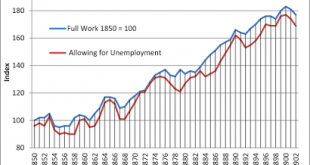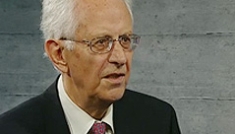It’s an all-too common refrain among US corporations: we have jobs available, but simply can’t find qualified workers to fill them. Economists, including top Federal Reserve officials, lend credibility to this dubious claim by arguing there is a "skills gap" among US workers that is preventing firms from finding employees with the right backgrounds. However, ample research and basic common sense suggests that wage stagnation, which has dominated the US job landscape in recent decades, is...
Read More »Can Capitalists Afford a Trumped Recovery? Guest post by Jonathan Nitzan & Shimshon Bichler
Your access to this site has been limited Your access to this service has been temporarily limited. Please try again in a few minutes. (HTTP response code 503) Reason: Exceeded the maximum number of page requests per minute for humans. Important note for site admins: If you are the administrator of this website note that your access has been limited because you broke one of the Wordfence blocking rules. The reason your access was limited is: "Exceeded the maximum number of page requests per...
Read More »Hillary: The “Good News” is That China is “Forcing Down Wages”
By William K. BlackOctober 23, 2016 Kansas City, MO The general media has been treating the WikiLeaks disclosures of the Clinton campaign documents, particularly the transcripts of her lucrative talks with Goldman Sachs as much ado about nothing. I have not found any article about the disclosures, however, that reported on the extraordinary statements she made in her talk with Goldman Sachs on June 4, 2013. Hillary told the Vampire Squid that the “good news” was that China was removing...
Read More »Mass Immigration for Thee, but not for Me
That is, if you are a highly paid, middle class professional in the West, as Dean Baker notes:“The trade agreements that the United States has negotiated over the last three decades have been about getting low cost auto workers, steel workers, and textile workers. In addition, immigration policy has been designed to ensure that custodians, farmworkers, and dishwashers all work for low wages. These policies have been successful in pushing down wages for large segments of the work force, not...
Read More »Engels’ Pause: A Cause of Marx and Engels’ Hasty and False Generalisations about Capitalism
The expression “Engels’ Pause” was coined by Robert C. Allen and refers to the period of real wage stagnation or low real wage growth in Britain in the early 19th century from about 1800 to 1840, even when real per capita GDP was rising in an historically unprecedented manner. You can see the “pause” in the graph of historical British real wages and per capita GDP per worker here.First, it is important to note that some economic historians have challenged the data on GDP and real wages in...
Read More »Marx on Wages in Value, Price and Profit (1865)
Marx’s Value, Price and Profit was a series of lectures he delivered in 1865, even though it was first published in 1898.In this work, Marx has the following to say about the determination of wages in capitalism: (1) “I might answer by a generalization, and say that, as with all other commodities, so with labor, its market price will, in the long run, adapt itself to its value; that, therefore, despite all the ups and downs, and do what he may, the working man will, on an average, only...
Read More »Marx and the “Iron Law of Wages”
This is an interesting point about Marx’s economic theory: he rejected the orthodox Classical “iron law of wages.” Nevertheless, there are still severe problems with Marx’s theory of wages.In essence, the Classical “iron law of wages” was derived from (1) the wage fund theory in Classical economics and (2) Malthusian population theory. The “iron law of wages” was, then, in view of (2) a kind of “law of nature.”By contrast, Marx rejected Malthusian population theory (Baumol 1983: 304, 305),...
Read More »What Drives Government Bond Yields?
For us the five major drivers of government bond yields are: Inflation expectations and inflation: The by far most important criterion. High inflation expectations must be compensated via higher bond yields. The main driver behind inflation expectations is the wage development, this is the form of inflation that typically persists. Price inflation follows inflation expectations with a certain lag. Wealth: The higher the wealth of a country, the lower the bond yields. Wealth is typically...
Read More » Heterodox
Heterodox


